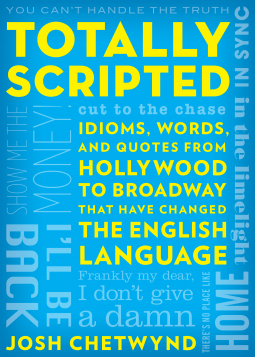
Totally Scripted
Idioms, Words, and Quotes from Hollywood to Broadway That Have Changed the English Language
by Josh Chetwynd
This title was previously available on NetGalley and is now archived.
Send NetGalley books directly to your Kindle or Kindle app
1
To read on a Kindle or Kindle app, please add kindle@netgalley.com as an approved email address to receive files in your Amazon account. Click here for step-by-step instructions.
2
Also find your Kindle email address within your Amazon account, and enter it here.
Pub Date Feb 01 2017 | Archive Date Apr 14 2017
Rowman & Littlefield | Lyons Press
Description
Available Editions
| EDITION | Other Format |
| ISBN | 9781630762827 |
| PRICE | $14.95 (USD) |
Average rating from 9 members
Featured Reviews
 Kathleen W, Reviewer
Kathleen W, Reviewer
If you have ever uttered a phrase in casual conversation, then thought to yourself, "I wonder where that saying comes from..." and immediately consulted the internet to learn the origin, this is a book for you! Josh Chetwynd has compiled words and phrases related to the entertainment business that have entered the common vernacular. These entries are approximately a page long and they discuss early usage in history, and how some facet of the entertainment industry has changed their meaning over time. (My favorite being "money shot". I can't help but giggle when this is used with any other intended context.)
Along with the etymology, there are also pages of famous film quotes that are so often quoted, many people may not even know what movie they are from any more. This may have been my favorite part of the book, as they give some more background on these iconic lines, and how many didn't even make it into the script but were ad-libbed.
Readers who liked this book also liked:
John Kotter; Holger Rathgeber
Business, Leadership, Finance, Nonfiction (Adult)








